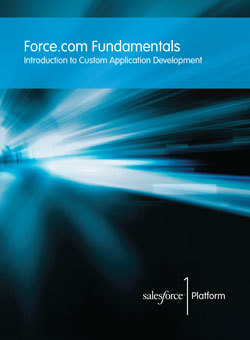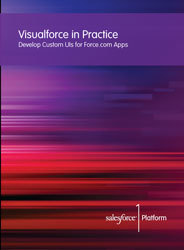Editor’s note: When Shoby Abdi told me he was training a new team of developers to work on the Salesforce1 Platform, I immediately asked him to share his approach and experience. Although every organization, team and developer has different needs, I believe you’ll find his approach insightful and easily adaptable. You might also enjoy this earlier article, Advice for Developers New to the Salesforce Platform.
TL;DR: Get a Developer Edition. Complete the Force.com Workbook. Get to know the Force.com Fundamentals Book. Explore your Developer Edition’s Setup Menu and Help system. Review the Study Guide. Take the test. If you don’t pass, study some more, take it again.
I’ve worked with the Force.com Platform for the last six years, and recently took a new position leading the salesforce.com consulting practice for an established company new to this technology, 7Summits. The first thing I had to do was cross-train our existing developers on how to use the Force.com Platform. This post outlines my approach.
Note that this approach is not just for traditional programmatic developers. Most of this process focuses on core declarative platform capabilities, things like creating an object, writing a report and configuring security. Many business analysts who aren’t interested in coding do all these things every day with salesforce.com.
The most important aspect when training a new technical team is to document the entire process for training and certification. Our developers come from a variety of backgrounds — Java, Ruby, Node.js — so they know how to code and how to build apps. My job is to help them transfer these skills to this new platform.
First, each developer needs to get their own Developer Edition org (DE). It creates a personal sandbox that allows you to train and experiment in, and you can use it for life.
The next step is to get the Force.com Workbook. When I was at Dreamforce 2013, I grabbed a stack of Force.com Workbooks and shoved them into my bag. Going through the workbook is typically a one to two day project for experienced technical folks and business analysts. It’s best to advise the BAs to skip the Apex, Visualforce and API sections (even though those are the fun parts).
 Once a new developer has had a chance to go through the workbook, it’s time to jump into the Force.com Fundamentals book. This is a great way to prepare for developer certification, because this book focuses on the clicks portion of app development, and skips most of the code. Understanding the declarative aspects of the salesforce.com is essential to building an effective solution.
Once a new developer has had a chance to go through the workbook, it’s time to jump into the Force.com Fundamentals book. This is a great way to prepare for developer certification, because this book focuses on the clicks portion of app development, and skips most of the code. Understanding the declarative aspects of the salesforce.com is essential to building an effective solution.
An important point is that the Fundamentals book is an excellent resource, but it’s not an all-encompassing one. When you and your developers have access to a Developer Edition org, you will have access to the setup menu and to the help system. The various study guides are great, but using the platform, exploring the setup menu and searching help is the best way to dive deep into Salesforce.
A quick aside on certification. 7Summits is new to the Salesforce ecosystem, so there were a lot of questions around whether certification was necessary from a customer implementation perspective. Certification isn’t an end in and of itself. Certification is a covenant between three groups: us, our customer, and salesforce.com. We are saying, “we have the people with the right stuff to get it done,” salesforce.com is saying, “we acknowledge they have the right stuff to get it done,” and our customer simply wants the right stuff done. Certification helps us all. [Note: additional certification info is here.]
The great thing about the Fundamentals book and the Developer Certification is that you do not need to be a classic programmatic coder to get certified. In fact, there is no code on the test. It’s all declarative, which means that many non-developers are pursuing the certification so they can understand the platform as well.
When one of my developers says they’re ready for the certification, I schedule a call with them to review their knowledge and set expectations around the exam itself (no notes, for example). Many developers will never feel completely ready, but there’s a solution for that: simply take the test. Pass or fail, you’ll learn something, something that will help you the next time and which you can share with the team. Then you take it again. As a team, it’s important to have both a cadence around achieving certification and a brain trust that new people can learn from.
Once someone has passed the Certified Developer exam, I layer in more advanced training material. In our case, since we do a lot of work around Communities, this means things like Site.com, Visualforce and Apex. Part of this more advanced training is linking to great resources on the developer site and in the broader community. For example, Joe Morse’s blog on Community Containers is a gold mine for a company like ours.
The last three resources are great in different ways. First, I want to call out the Salesforce1 App Developer Guide. It is a treasure trove of information and examples designed to help developers create great mobile apps. Next is Visualforce in Practice. If your users are looking for highly optimized user experiences, Visualforce is your tool of choice and this book guides you through its many capabilities. Finally, I want to call out the Salesforce UX Style Guide. This is your goto site for building publisher actions and flexible pages on Salesforce1.
Lastly, if your team is like mine, they’ll probably hit you up for a “real” project very early in the learning curve. That’s great. In fact, at every step along the way, the more time you and your team spend in the Salesforce app the better.
That’s my approach. I’ve found it a great way to get people started on the Salesforce1 Platform. If you have comments or suggestions, I’d love to hear them.
About 7Summits
Shoby Abdi (@shobyabdi) is a Senior Director of Technology for 7Summits (@7summitsagency). 7Summits is a social business solutions provider founded in 2009 to help companies engage customers, partners and employees and grow their businesses. 7Summits offers deep expertise in social business strategy, community experience design, platform development and integration, and community activation.

